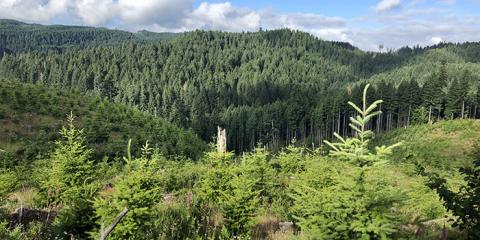Thankful for Oregon’s Forests
November 19, 2019
Oregon’s abundant forests provide us with many reasons to be thankful. Oregon contains nearly 30 million acres of forestland, which is almost half the state. We depend on our vast forests in many ways. Here are some of the top reasons that I am thankful for Oregon’s forests:
Oregon’s forests provide clean water
Forest soils provide natural filtration to keep streams clean and water quality high. Some 35 municipal water systems in Oregon source their drinking water from forested watersheds.
Oregon’s forests clean our air
Trees absorb carbon dioxide (CO2), removing and storing the carbon while releasing oxygen back into the air. In the U.S., carbon stores in forests and forest products are estimated to offset 10 to 20 percent of total fossil fuel emissions.
Oregon’s forests provide habitat to fish and wildlife
All of Oregon’s forests – whether they’re mostly new growth, old-growth or somewhere in between – provide habitat for an array of wildlife. Some species, like migrating songbirds, are dependent on young forests, while older forests are vital to species like the northern spotted owl. We also depend on our cool forest streams to provide habitat for native salmon.
Oregon’s forests provide family wage jobs
Over 61,000 Oregonians work in the forest sector. There are a wide variety of jobs – from forestry, logging, millwork and cabinet-making to engineering, hydrology, business management and academic research. The average annual wage for forest sector jobs is $54,200, which is roughly 6% higher than the average annual wage for all Oregon employment.
Oregon’s forests provide recreation opportunities
There is an endless list of recreation opportunities in Oregon’s forests. Hiking, fishing, camping, picnicking and bird-watching are among the top recreational pursuits that Oregonians enjoy. Recreation takes place on Oregon’s 11 National Forests and six State Forests, and many private forest landowners provide access to the public for recreation.
Oregon’s forests provide sustainable wood products
The wood that is sustainably harvested from Oregon’s forests goes into many products that we interact with every day. The home you live in, the cabinets in your kitchen, the wood in your flooring, and the table that you’ll gather around with family and friends for Thanksgiving are likely constructed with wood.
As I reflect on Oregon’s forests, I am grateful for all the social, environmental and economic benefits that they provide.
Erin Isselmann
Executive Director
